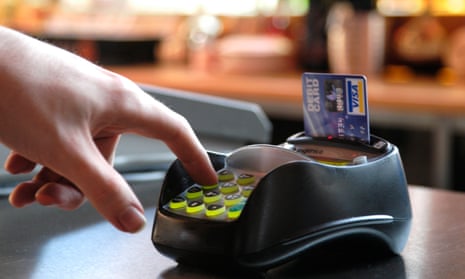My mother was gleeful. We had identified a pair of designer trainers coveted by her grandson and she had resolved to buy them for his Christmas present. She braved the Saturday scrum in Footasylum, queued on painful legs for the till and wrestled the shoebox into her shopping bag. It was then she was told that her custom was not allowed.
Like many people with disabilities, my mother uses a “chip and signature” debit card because she is unable to manage a pin. The cards, issued by Visa and Mastercard, operate in the same way as chip and pin, except that when they are inserted into a card reader, a message informs the trader that a signature is required.
Banks issue them to customers who can’t memorise or can’t key in a personal security number. However, Footasylum staff informed her that it could not complete the transaction because the company did not accept signatures as a valid verification and the bill was more than the £30 contactless payment limit.
My mother was run over and seriously injured on her way home from work five years ago. Once a daily visitor to the high street, she can now only leave the house when there’s someone to take her and her rare shopping trips have become her chief pleasure.
Because brain damage from the accident means she can’t memorise a pin, she’s unable to use cash machines and therefore relies on her Visa card to pay for goods. And every so often she endures humiliation when store staff refuse to accept it.
At Topshop her attempt to treat her granddaughter to a jacket was thwarted when her card was declared invalid, and on a one-off trip to Asda she had to abandon her shopping, after it had been packed into bags, because the cashier and the store manager insisted that they could not accept a signature. Both stores declared it was company policy.
Head office in each case confirmed that it was not so, and that new guidance would be issued to staff. Footasylum, however, stood firm. Its refusal of chip and signature cards was a business decision for security reasons, customer services told me.
It is, in fact, illegal for traders who accept card payments to discriminate against these cards, according to the financial trade association UK Finance. “The 2010 Equality Act has reinforced the legal responsibility for all businesses to cater for customers with protected characteristics – and this includes accepting a chip and signature card,” it says.
“Every pin terminal is designed to accept them – simply put the card in and the retailer will be automatically prompted to ask for a signature. A card should never be rejected simply because it is chip and signature.”

Except it often is. The bestselling author Joanne Harris relies on one of these cards and says that she is turned away by checkout staff every few weeks.
“I suffer from dyscalculia, the inability to process and remember numbers,” she says. “I’ve been told by JD Sports staff, and by its customer service, that it’s company policy to refuse the cards for security reasons, except in the case of international customers. My local Tesco has refused it on several occasions, despite a letter from head office telling them otherwise, and House of Fraser apologised fulsomely after it did the same before repeating the error. This behaviour, either as a result of poor training or because of an illegal policy, denies access to a disabled minority. It humiliates me in public and makes me feel like a criminal. But my main concern is for elderly people, who may be reluctant to state their rights, and may be more likely to believe the ‘store security policy’ myth.”
JD Sports, Tesco and House of Fraser all confirmed to the Observer that, contrary to what store staff claimed, they did accept chip and signature cards and would remind their staff of the fact.
The problem seems to be ignorance, rather than intolerance. Although the cards are widely used by those with disabilities, even national bodies we contacted appear to be unfamiliar with them. UK Finance, despite a page on its website about the legal requirement to accept them, initially referred me to the British Retail Consortium (BRC), which referred me back to UK Finance. The BRC admitted that it was not an issue it had come across before and said its payments policy adviser would investigate and it might issue guidance to its members in the future.
Footasylum, which is not a member of the BRC, tells me that it was unaware of a legal requirement to accept the cards. “We acknowledge your concerns and we are going to raise it to the highest level we can from a retail standpoint,” was the initial response from customer service. “We do not want to be in breach of any laws and we will do our best to correct any mistake or process currently in place.”
After the issue was highlighted by the Observer the company added: “We are grateful to have had this incident brought to our attention because, while we have the technology in our stores to allow chip and signature payment, it is clear that this is not widely understood among our colleagues. This is in part because requests to pay by chip and signature are infrequent.
“However, we are now rolling out a training programme across all of our stores and customer experience teams to help ensure that colleagues are fully aware of this method of payment and can comply with any future requests of this kind.”
Although it’s an invisible problem to the majority of shops and shoppers, the impact on those affected is huge. The accident which deprived my mother of her career and her mobility means that she can no longer care for her disabled husband, cook a meal or babysit for her grandchildren.
Treating those who now care for her to small gifts is the one way she feels she can contribute, and is therefore essential to her sense of self-worth. Each time her card is refused, it’s a reminder of the independence she has lost and the powerlessness of disability.
“Disabled people must be treated like everyone else and not like second-class citizens,” says Rebecca Hilsenrath, chief executive at the Equality and Human Rights Commission. “Under the Equality Act businesses must make reasonable adjustments so that disabled people aren’t unfairly disadvantaged, and sensible, modern businesses should value their custom.”
Excluded from the high street
People with disabilities are likely to be disproportionately affected by financial exclusion, despite a legal requirement for companies to make “reasonable adjustment” to accommodate them, and pin codes and security questions are a particular problem, according to a parliamentary select committee report published in 2017.
Customers with visual impairment struggle to acquire pin codes in braille and the report found cases where banks insisted on telephoning deaf customers and were unable to offer another form of contact.
Bank and ATM closures are causing further isolation, since only 64% have access to the internet compared with 89% of the population as a whole, meaning that online banking services are beyond the reach of more than a third.
The charity Mencap has called for banks to offer essential information such as charges and terms and conditions in more accessible formats to cater for a variety of needs.
The Financial Conduct Authority agrees that vulnerable customers are being “let down” and is this year consulting on guidance for firms. “We have challenged the industry on its treatment of vulnerable consumers and sought to stimulate debate on wider access issues,” it says.
“We continue to encourage firms to consider the challenges faced by consumers in a changing world, particularly those in vulnerable circumstances, and take steps to mitigate potential risks or harm.”











Comments (…)
Sign in or create your Guardian account to join the discussion